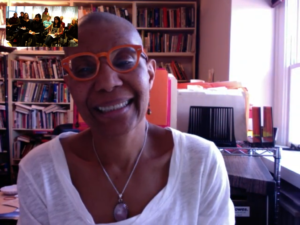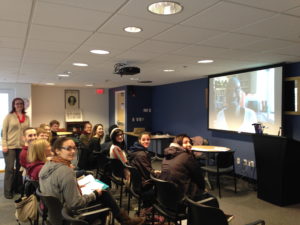Rachel May’s Creative Writing/Nonfiction class was honored and delighted to visit with M. NourbeSe Philip via Skype, to talk about her book Zong!. Philip is the author of three previous books of poetry, two novels, and many essays and stories. She’s been awarded the Guggenheim and residencies at the prestigious MacDowell Colony and the Rockefeller Foundation in Bellagio, Italy, among other honors.
Zong! is based on a 1781 court decision, to determine whether or not owners of the slave ship, Zong, could collect insurance money after 150 people were pushed overboard, murdered, by the ship’s captain. Philip, a lawyer as well as a poet, used the language of the document to tell the story of the Africans who were killed that day. She fragmented the language, recombined words, and moved them into the shape of what looks like water drifting across the page.
You can read an excerpt of the text, and an explanation of the book and Philip’s process here: Fascicle.
One issue with which May’s students grappled is the horror of this story, the details of what happened on-board Zong, much of which is given voice in the text. Class questions centered around whether or not this was poetry, history or historiography, how we take on another person’s voice to tell a story, and what it means to erase and fragment language, either found or our own.
Philip said, in response: “One of the things I was really interested in was that the reader was going to be allowed choices in how they read this. If you wanted, you could read it diagonally down, or when I read with some colleagues, one of my friends started reading backwards. There’s no right way. But there’s a shadow side to that, and the shadow side is that as we make our choices, we become contaminated by what happened on-board that ship. So, do we read this to avoid seeing some of the things that happened there? They’re happening in these fragments: Is a baby being cut out of a mother’s womb? Is somebody being raped? Are these people gambling for a woman? You can read the book in a way that you avoid that story or you sink into it.”
The visit concluded with a powerful reading by Philip — followed by complete silence as the class processed her embodiment of the text.
The full transcript of the visit will be published in the Summer 2014 issue of The Ocean State Review; please look for it there.
Many many thanks to M. NourbeSe Philip for her work and for making time for this life-changing visit.


